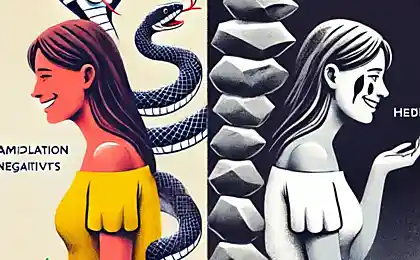634
Friendship with a catch: the typical signs of "adverse" friendship
Studies show that friendship helps us to maintain mental and physical health: improves immunity, maintains normal blood pressure, reduces the risk of dementia in the elderly, and even the risk of sudden death.
But even with the best communication friends can suddenly become sickeningly tense.
Journalist Carlin flora described the different types of toxic relationships and explained how problems arise with friends and why it's not always a bad thing.
Published a translation of her article.
Ninety three million two hundred thirty four thousand two hundred eleven
Remember how the last time you sat in front of best friend and felt that she knows and, most importantly, to really understand. Maybe you ever feel that it awakens in you the best quality in her presence you manage the most sensible comments and the wittiest jokes.
She has inspired. She always listened carefully, find hidden patterns in your behavior, and then gently suggested how to bring about change.
You loved to gossip about mutual friends from time to time reminiscing about joint adventures. You are deep into your favorite topics, exchanged barely understandable to others hints and easily deciphered meaningful euphemisms in the speech of each other.
Perhaps you even know a pleasant sense of admiration for his girlfriend, which was accompanied by a sense of pride from realizing your similarities with her.
The man of whom you were very high regard, mutually appreciated you — of course, it brought a feeling of deep satisfaction and happiness, literally fueled energy.
This friendship fills us with spiritual strength, form our personality, and sometimes can change our destiny.
This relationship has been under the microscope of scientists-sociologists — thus it became clear that they help us to maintain mental and physical health, good friends will improve the immune system, stimulate creativity, support normal blood pressure, reduce the risk of dementia in the elderly, and even the risk of sudden death.
So if you feel you can not live without friends, tells you not only sentimentality, but also common sense.
But even the most deep and good friendship, as with almost any human relationship, can spoil the conflict, resentment and tension. She could permanently fade the charm it can even completely disappear for some sad reason or for no single reason at all.
But there are also not-so-beneficial friendship: sometimes in a relationship that began on a positive note, conflict is growing every day, and in critical cases, the friendship may be initially painful, toxic. Good friends make us happy, but even they are asking a lot in return. If you look closely as it should, friendship is a much more intricate and ambiguous relationship than people think.
For the first time the harsh reality cast a shadow on a cloudless concept of friendship, when social scientists were convinced that a friendly mutual only half of the cases. Many of this information is shocking: the same study say that obviously we tend to assume that our friends almost always share our feelings.
Can you guess who of your friends list would make the same list you?
One reason for the imbalance is that friendship is often socially desirable: research among adolescents shows that want to be friends with the popular people, and they often exhibit selectivity (and thereby upset the balance of reciprocity). One of the fresh evidence — an article by Stephen Strogatz in The New York Times, published in 2012. According to his observations, our friends on Facebook on average always more friends than ourselves. And they say that friendship is the salvation of the world, mad at the status updates. Here's your salvation!
Scientists have also isolated ambivalent kind of friendship — there is mutual dependence and conflict. If your life is such a friend, it makes you both positive and negative feelings. For example, seeing his name on the screen of the smartphone, you'll think twice before answering a call.
This kind of relationship is quite common. Each of us has a social network of important contacts, and, according to statistics, the ambivalent characters in it — about 50%. It is fair to say that it's most often family members, not friends (because relatives won't get away). However, this is another stone in the garden "unspotted" the concept of friendship.
But even those friends whom you can call loyal, trustworthy and interesting people, can spoil your life if to these qualities be added another, less attractive. Thanks to sociological research we know that :
In some cases, "good" friends appear goals, habits, or values that do not correspond to ours. Of course, these people did us no harm. But over time, they cease to be a group that defines our social identity and/or helps us to solve the pressing problem. Staying with them, we swim against the current.
Fifty five million six hundred fifty five thousand two hundred twenty seven
To all the unfortunate effects contradictory ambivalent friendship is attributed real harm to our health. In 2003, scientists Julianne Holt-Lunstad from Brigham young University and Bert who committed from the University of Utah conducted a joint study: participants were asked to wear portable blood pressure monitor and keep a written record of your interactions with people during the day. The readings claimed that blood pressure when dealing with ambivalent friends were higher than during really friendly and even openly hostile communication. This is probably due to the fact that such relationships are largely unpredictable, and therefore force us all to be vigilant: "whether Jane is back to spoil your Christmas eve?»
Furthermore, the ambivalent relationship with such unpleasant phenomena as the violation reactivity of the cardiovascular system, premature cellular senescence, low levels of stress and deterioration in General health.
However, in one case, the researchers ambivalent friendship came to an unexpected result: it turned out that it has a positive effect on the workflow. As the researchers found, ambivalent colleagues tend more often than usual to put yourself in the other — partly because in such a relationship there is always a place of uncertainty and people trying to understand what they actually represent. In addition, ambivalent friendship adds uncertainty, which in turn makes people work harder to strengthen its position.
Psevdodruzya, or friends-enemies — another kind of contradictory relationship between people. But in this case, the contrasting feelings are accurately superimposed on each other: the friendliness on top of rivalry or hostility in contrast to ambivalent connection with its explosive cocktail of love, hate, anger, pity, affection, disgust, tenderness and a few unpredictable ingredients.
Many of us know firsthand about the powerful force of motivation, which gives the existence of such friend-enemy in the office, not to mention romantic or parent-child relationships in which this power can become destructive.
Every unhappy family is unhappy in its own way, the same can be said about the unfortunate cases of friendship: there are countless reasons why a friend can be "adverse" to you. This topic is deepened by a pair of American researchers — Susan Heitler, a clinical psychologist from Denver, and Sharon Livingston, a psychologist and marketing consultant from new York.
Here are some typical signs of "adverse" friendship that they have found:
In 2014, the staff of the University of Carnegie Mellon (Pittsburgh) found an interesting correlation, studying the social life healthy women over 50 years. It turned out that,if in their relationships with others increased the amount of negative episodes at the same time increased the risk of development of hypertension. Negative social interactions — for example, excessive demands and criticism from others, frustration, "exchange of courtesies" — led to the fact that the appearance of hypertension in the subjects was 38% more likely.
But men have not discovered any connection between negative communication and increased blood pressure. This is probably due to the fact that women in General are more concerned with the relationships between people and they are socially predisposed to pay more attention to them.
Negative communication also contributes to inflammatory processes in the body — both women and men. Such data obtained in the process of their study, Jessica Chiang, research fellow, University of California (Los Angeles). According to her findings, the accumulated social stressors, as these toxins can cause the person physical harm.
The friendships that are destined to become the most painful in our lives often begin on a positive note and then it turns into a nightmare. For example, a recent study among adolescents showed that people in the past tied friendship is 4.3 times more likely to Express mutual aggression in the Internet space, rather than just acquaintances.
In other words, sociological statistics agree with Diane de Poitiers (mistress of king Henry II), which in the XVI century, argued:"in Order to have standing enemy, choose a friend: he knows where to strike".
Another slippery slope, which may suddenly collapse friendship, described by the writer Robert Greene book "the 48 laws of power". Friendly assistance in finding employment, he warned,can lead to the fact that your relationship will gradually change from good into bad. This is due, in particular, with the peculiarities of emotional reactions that they provoke such a serious favor.
Twenty one million eight hundred sixty three thousand five hundred sixty seven
Ironically, it is the act of your kindness can bring the relationship out of balance. People want to feel that their success is deserved. A friendly favor can cause disturbing thoughts: "What if I chose only because of the links? Maybe I'm not worthy of this place?"The condescending attitude that is easy to suspected sympathizers of the other, may seriously injure the self-esteem. The injury is not immediately discernible, but gradually the relationship will become more rough directness, there will be outbreaks of discontent and envy, and before you have time to understand something, the friendship will end.
"So what is to destroy a true friendship can integrity and selfless help?"you may ask.
On the one hand, this statement challenges the ideals of absolute openness and boundless generosity — mandatory attributes in sincere and friendly attachment. But on the other hand, it seems that here is hidden the clue to why friendships can be supportive, ambivalent, and bad, and even move from one state to another.
In his article "the Evolution of reciprocal altruism" published in 1971, the evolutionary biologist Robert Trivers concluded:
"Every individual is inclined to take the trend as to the altruistic behavior, and cheating".
Under the Scam here refers to a conscious intention to give in their relationship at least a little less or take at least a little more than have or would have given our friend in a similar situation.
Trivers explains that evolution has made us skillful cunning rogues. The complex mechanism of our psyche helps us to detect those who cheat too openly, and to notice when we become too generous.
Trivers writes:
"Rude crook is not going to reciprocate, and altruist as a reward for his generosity won't get nothing... Obviously, in this case natural selection will set up negatively against the crook. A clever Scam, in contrast, involves a degree of reciprocity. This art is to give less than they receive — or, more precisely, to give less than was given to the partner in the opposite situation."
Perhaps it was this balance between egoism and altruism, the average of which is closer to 50/50, explains many of the other 50% of the indicators, and then emerging in studies of friendships.
Let us recall: only 50% of friends are mutual, our social networks consist of 50% of the ambivalent relationship.
Even to spot a lie the average person capable of only 50% of cases.
Evolution has made us astute enough not to allow yourself to cheat, but at the same time, saved us from the inevitable agony that would have brought a life into the world of the absolute harsh truth. So we have left a loophole for the compliments and lies.
Similarly, we can recognize a Scam from the friends, but not too brilliantly, or we would have risked not to lose faith in people and any desire to maintain friendly relations. Nature keeps a perfect balance of 50/50.
Psychologist Ian Yager conducted a survey for his book "When friendship hurts" (2002) and found that 68% of respondents faced with the betrayal of friends. Who are these heartless traitors? Why so many? However, the figure is 68% — maybe not "them" and "us"?
This frightening thought made me wonder:
Do we strive to forgive petty grievances?
To Express dissatisfaction, before they accumulate and make you end the relationship forever?
To find time for a long-awaited meeting?
To recognize the right of another person not to agree with us?
Do we really try to give generously, not in the lead?
We press if we friends on unjustified expectations?
Is it true that we are doing everything possible to save the friendship?
Well, maybe most of our friends, too, think of myself that way. And if they do wrong or we are taking away from each other in a natural flow of life, perhaps we should accept it and not to label toxicity in the relationship we just don't want to support.
When the relationship is terminated at the initiative of the other, or he disappears from our lives without any explanation, it can be excruciatingly painful. And although it's no secret that the circle of social contacts narrows as they grow older, we still somehow believe that friendship is forever.
The rupture of friendly relations forces us to rethink our own vision of life and self, especially if a friend was around for many years. While fresh wound pulsing in pain, we rush to brand him or her a traitor.
Ninety two million five hundred sixty two thousand eight hundred one
But sometimes we have to leave one another to be ourselves. In his book "Connecting in College" (2016) sociology Professor Janice McCabe said that the rupture of friendly relations at the initial stage of maturation is an important part of personal development. Inevitably, we formed our personality and identity based on our surroundings or want to certain people or repel them.
Despite the fact that we all need to look beyond their friendly behavior and to accept responsibility for the conflicts that sometimes arise in the relationship, yet there are aspects of friendship that are beyond our control.
For example, a large number of friends and acquaintances can be the cornerstone in an ambiguous situation. Let's say your friend crossed the line, but you don't want to bother your conflict your entire company and therefore does not declare publicly that you no longer wish to have it. You just distance myself from her, but gently, so as not to cause an open confrontation and not to force mutual friends to choose each time which one of you to invite guests. In such cases, we remain chained to the "bad" friends forever.
The laws that dictate us who to stay close and who to let go of, sometimes remain a mystery even for us.
Perhaps the first will wear you to the list of "bad" friends in this very moment.
Faced with toxic friendships, experiencing painful tears and frustration, we experience great stress, able to bring not only psychological but even physical harm. But you must admit that not having friends at all is even more sad fate.
Loneliness can cause the same pangs as hunger or thirst. John Cacioppo, Professor-sociologist from the University of Chicago found a link between loneliness and such problems as depression, obesity, alcoholism, problems of the cardiovascular system, sleep disorder, hypertension, early development of Alzheimer's disease, and a cynical view of the world and suicidal thoughts.
So as long as you have problems with your friends, you can consider yourself lucky: at least it means that you have friends.published
P. S. And remember, just changing your mind — together we change the world! ©
Source: theoryandpractice.ru/posts/15909-druzhba-s-podvokhom-kak-druzya-menyayut-nashu-zhizn-k-khudshemu
But even with the best communication friends can suddenly become sickeningly tense.
Journalist Carlin flora described the different types of toxic relationships and explained how problems arise with friends and why it's not always a bad thing.
Published a translation of her article.
Ninety three million two hundred thirty four thousand two hundred eleven
Remember how the last time you sat in front of best friend and felt that she knows and, most importantly, to really understand. Maybe you ever feel that it awakens in you the best quality in her presence you manage the most sensible comments and the wittiest jokes.
She has inspired. She always listened carefully, find hidden patterns in your behavior, and then gently suggested how to bring about change.
You loved to gossip about mutual friends from time to time reminiscing about joint adventures. You are deep into your favorite topics, exchanged barely understandable to others hints and easily deciphered meaningful euphemisms in the speech of each other.
Perhaps you even know a pleasant sense of admiration for his girlfriend, which was accompanied by a sense of pride from realizing your similarities with her.
The man of whom you were very high regard, mutually appreciated you — of course, it brought a feeling of deep satisfaction and happiness, literally fueled energy.
This friendship fills us with spiritual strength, form our personality, and sometimes can change our destiny.
This relationship has been under the microscope of scientists-sociologists — thus it became clear that they help us to maintain mental and physical health, good friends will improve the immune system, stimulate creativity, support normal blood pressure, reduce the risk of dementia in the elderly, and even the risk of sudden death.
So if you feel you can not live without friends, tells you not only sentimentality, but also common sense.
But even the most deep and good friendship, as with almost any human relationship, can spoil the conflict, resentment and tension. She could permanently fade the charm it can even completely disappear for some sad reason or for no single reason at all.
But there are also not-so-beneficial friendship: sometimes in a relationship that began on a positive note, conflict is growing every day, and in critical cases, the friendship may be initially painful, toxic. Good friends make us happy, but even they are asking a lot in return. If you look closely as it should, friendship is a much more intricate and ambiguous relationship than people think.
For the first time the harsh reality cast a shadow on a cloudless concept of friendship, when social scientists were convinced that a friendly mutual only half of the cases. Many of this information is shocking: the same study say that obviously we tend to assume that our friends almost always share our feelings.
Can you guess who of your friends list would make the same list you?
One reason for the imbalance is that friendship is often socially desirable: research among adolescents shows that want to be friends with the popular people, and they often exhibit selectivity (and thereby upset the balance of reciprocity). One of the fresh evidence — an article by Stephen Strogatz in The New York Times, published in 2012. According to his observations, our friends on Facebook on average always more friends than ourselves. And they say that friendship is the salvation of the world, mad at the status updates. Here's your salvation!
Scientists have also isolated ambivalent kind of friendship — there is mutual dependence and conflict. If your life is such a friend, it makes you both positive and negative feelings. For example, seeing his name on the screen of the smartphone, you'll think twice before answering a call.
This kind of relationship is quite common. Each of us has a social network of important contacts, and, according to statistics, the ambivalent characters in it — about 50%. It is fair to say that it's most often family members, not friends (because relatives won't get away). However, this is another stone in the garden "unspotted" the concept of friendship.
But even those friends whom you can call loyal, trustworthy and interesting people, can spoil your life if to these qualities be added another, less attractive. Thanks to sociological research we know that :
- depressed with each likely to tempt you to share his depression,
- fat friend — to gain weight,
- and with friends who smoke a lot or drink, and you will drink and smoke more.
In some cases, "good" friends appear goals, habits, or values that do not correspond to ours. Of course, these people did us no harm. But over time, they cease to be a group that defines our social identity and/or helps us to solve the pressing problem. Staying with them, we swim against the current.
Fifty five million six hundred fifty five thousand two hundred twenty seven
To all the unfortunate effects contradictory ambivalent friendship is attributed real harm to our health. In 2003, scientists Julianne Holt-Lunstad from Brigham young University and Bert who committed from the University of Utah conducted a joint study: participants were asked to wear portable blood pressure monitor and keep a written record of your interactions with people during the day. The readings claimed that blood pressure when dealing with ambivalent friends were higher than during really friendly and even openly hostile communication. This is probably due to the fact that such relationships are largely unpredictable, and therefore force us all to be vigilant: "whether Jane is back to spoil your Christmas eve?»
Furthermore, the ambivalent relationship with such unpleasant phenomena as the violation reactivity of the cardiovascular system, premature cellular senescence, low levels of stress and deterioration in General health.
However, in one case, the researchers ambivalent friendship came to an unexpected result: it turned out that it has a positive effect on the workflow. As the researchers found, ambivalent colleagues tend more often than usual to put yourself in the other — partly because in such a relationship there is always a place of uncertainty and people trying to understand what they actually represent. In addition, ambivalent friendship adds uncertainty, which in turn makes people work harder to strengthen its position.
Psevdodruzya, or friends-enemies — another kind of contradictory relationship between people. But in this case, the contrasting feelings are accurately superimposed on each other: the friendliness on top of rivalry or hostility in contrast to ambivalent connection with its explosive cocktail of love, hate, anger, pity, affection, disgust, tenderness and a few unpredictable ingredients.
Many of us know firsthand about the powerful force of motivation, which gives the existence of such friend-enemy in the office, not to mention romantic or parent-child relationships in which this power can become destructive.
Every unhappy family is unhappy in its own way, the same can be said about the unfortunate cases of friendship: there are countless reasons why a friend can be "adverse" to you. This topic is deepened by a pair of American researchers — Susan Heitler, a clinical psychologist from Denver, and Sharon Livingston, a psychologist and marketing consultant from new York.
Here are some typical signs of "adverse" friendship that they have found:
- a bad friend can make competition with other friends;
- it is much more common than you says about themselves;
- it allows yourself down to criticize, but immediately took a defensive position, if you criticize her back;
- during intercourse, you will feel like you're on thin ice, because at any moment can trigger the flash of her anger or disapproval;
- in relationships dominated by the so-called emotional swing: today it can be responsive and friendly, and the next day pulls away and acts like he barely knows you.
In 2014, the staff of the University of Carnegie Mellon (Pittsburgh) found an interesting correlation, studying the social life healthy women over 50 years. It turned out that,if in their relationships with others increased the amount of negative episodes at the same time increased the risk of development of hypertension. Negative social interactions — for example, excessive demands and criticism from others, frustration, "exchange of courtesies" — led to the fact that the appearance of hypertension in the subjects was 38% more likely.
But men have not discovered any connection between negative communication and increased blood pressure. This is probably due to the fact that women in General are more concerned with the relationships between people and they are socially predisposed to pay more attention to them.
Negative communication also contributes to inflammatory processes in the body — both women and men. Such data obtained in the process of their study, Jessica Chiang, research fellow, University of California (Los Angeles). According to her findings, the accumulated social stressors, as these toxins can cause the person physical harm.
The friendships that are destined to become the most painful in our lives often begin on a positive note and then it turns into a nightmare. For example, a recent study among adolescents showed that people in the past tied friendship is 4.3 times more likely to Express mutual aggression in the Internet space, rather than just acquaintances.
In other words, sociological statistics agree with Diane de Poitiers (mistress of king Henry II), which in the XVI century, argued:"in Order to have standing enemy, choose a friend: he knows where to strike".
Another slippery slope, which may suddenly collapse friendship, described by the writer Robert Greene book "the 48 laws of power". Friendly assistance in finding employment, he warned,can lead to the fact that your relationship will gradually change from good into bad. This is due, in particular, with the peculiarities of emotional reactions that they provoke such a serious favor.
Twenty one million eight hundred sixty three thousand five hundred sixty seven
Ironically, it is the act of your kindness can bring the relationship out of balance. People want to feel that their success is deserved. A friendly favor can cause disturbing thoughts: "What if I chose only because of the links? Maybe I'm not worthy of this place?"The condescending attitude that is easy to suspected sympathizers of the other, may seriously injure the self-esteem. The injury is not immediately discernible, but gradually the relationship will become more rough directness, there will be outbreaks of discontent and envy, and before you have time to understand something, the friendship will end.
"So what is to destroy a true friendship can integrity and selfless help?"you may ask.
On the one hand, this statement challenges the ideals of absolute openness and boundless generosity — mandatory attributes in sincere and friendly attachment. But on the other hand, it seems that here is hidden the clue to why friendships can be supportive, ambivalent, and bad, and even move from one state to another.
In his article "the Evolution of reciprocal altruism" published in 1971, the evolutionary biologist Robert Trivers concluded:
"Every individual is inclined to take the trend as to the altruistic behavior, and cheating".
Under the Scam here refers to a conscious intention to give in their relationship at least a little less or take at least a little more than have or would have given our friend in a similar situation.
Trivers explains that evolution has made us skillful cunning rogues. The complex mechanism of our psyche helps us to detect those who cheat too openly, and to notice when we become too generous.
Trivers writes:
"Rude crook is not going to reciprocate, and altruist as a reward for his generosity won't get nothing... Obviously, in this case natural selection will set up negatively against the crook. A clever Scam, in contrast, involves a degree of reciprocity. This art is to give less than they receive — or, more precisely, to give less than was given to the partner in the opposite situation."
Perhaps it was this balance between egoism and altruism, the average of which is closer to 50/50, explains many of the other 50% of the indicators, and then emerging in studies of friendships.
Let us recall: only 50% of friends are mutual, our social networks consist of 50% of the ambivalent relationship.
Even to spot a lie the average person capable of only 50% of cases.
Evolution has made us astute enough not to allow yourself to cheat, but at the same time, saved us from the inevitable agony that would have brought a life into the world of the absolute harsh truth. So we have left a loophole for the compliments and lies.
Similarly, we can recognize a Scam from the friends, but not too brilliantly, or we would have risked not to lose faith in people and any desire to maintain friendly relations. Nature keeps a perfect balance of 50/50.
Psychologist Ian Yager conducted a survey for his book "When friendship hurts" (2002) and found that 68% of respondents faced with the betrayal of friends. Who are these heartless traitors? Why so many? However, the figure is 68% — maybe not "them" and "us"?
This frightening thought made me wonder:
Do we strive to forgive petty grievances?
To Express dissatisfaction, before they accumulate and make you end the relationship forever?
To find time for a long-awaited meeting?
To recognize the right of another person not to agree with us?
Do we really try to give generously, not in the lead?
We press if we friends on unjustified expectations?
Is it true that we are doing everything possible to save the friendship?
Well, maybe most of our friends, too, think of myself that way. And if they do wrong or we are taking away from each other in a natural flow of life, perhaps we should accept it and not to label toxicity in the relationship we just don't want to support.
When the relationship is terminated at the initiative of the other, or he disappears from our lives without any explanation, it can be excruciatingly painful. And although it's no secret that the circle of social contacts narrows as they grow older, we still somehow believe that friendship is forever.
The rupture of friendly relations forces us to rethink our own vision of life and self, especially if a friend was around for many years. While fresh wound pulsing in pain, we rush to brand him or her a traitor.
Ninety two million five hundred sixty two thousand eight hundred one
But sometimes we have to leave one another to be ourselves. In his book "Connecting in College" (2016) sociology Professor Janice McCabe said that the rupture of friendly relations at the initial stage of maturation is an important part of personal development. Inevitably, we formed our personality and identity based on our surroundings or want to certain people or repel them.
Despite the fact that we all need to look beyond their friendly behavior and to accept responsibility for the conflicts that sometimes arise in the relationship, yet there are aspects of friendship that are beyond our control.
For example, a large number of friends and acquaintances can be the cornerstone in an ambiguous situation. Let's say your friend crossed the line, but you don't want to bother your conflict your entire company and therefore does not declare publicly that you no longer wish to have it. You just distance myself from her, but gently, so as not to cause an open confrontation and not to force mutual friends to choose each time which one of you to invite guests. In such cases, we remain chained to the "bad" friends forever.
The laws that dictate us who to stay close and who to let go of, sometimes remain a mystery even for us.
- Think about it: do you have any friends that you are very cute, but with which thus you had not seen for several years?
- And Vice versa: whether in the close circle of those with whom you actually never found a common language?
Perhaps the first will wear you to the list of "bad" friends in this very moment.
Faced with toxic friendships, experiencing painful tears and frustration, we experience great stress, able to bring not only psychological but even physical harm. But you must admit that not having friends at all is even more sad fate.
- The child will always desperately seek a partner for the game,
- the teenager, who "really understands»,
- and adult — someone with whom you can truly share the joy of success and bitterness of failure.
Loneliness can cause the same pangs as hunger or thirst. John Cacioppo, Professor-sociologist from the University of Chicago found a link between loneliness and such problems as depression, obesity, alcoholism, problems of the cardiovascular system, sleep disorder, hypertension, early development of Alzheimer's disease, and a cynical view of the world and suicidal thoughts.
So as long as you have problems with your friends, you can consider yourself lucky: at least it means that you have friends.published
P. S. And remember, just changing your mind — together we change the world! ©
Source: theoryandpractice.ru/posts/15909-druzhba-s-podvokhom-kak-druzya-menyayut-nashu-zhizn-k-khudshemu
The art of Living: One of the main secrets
Irina Medvedev: the Lack of sexual shame — a sign of schizophrenia























